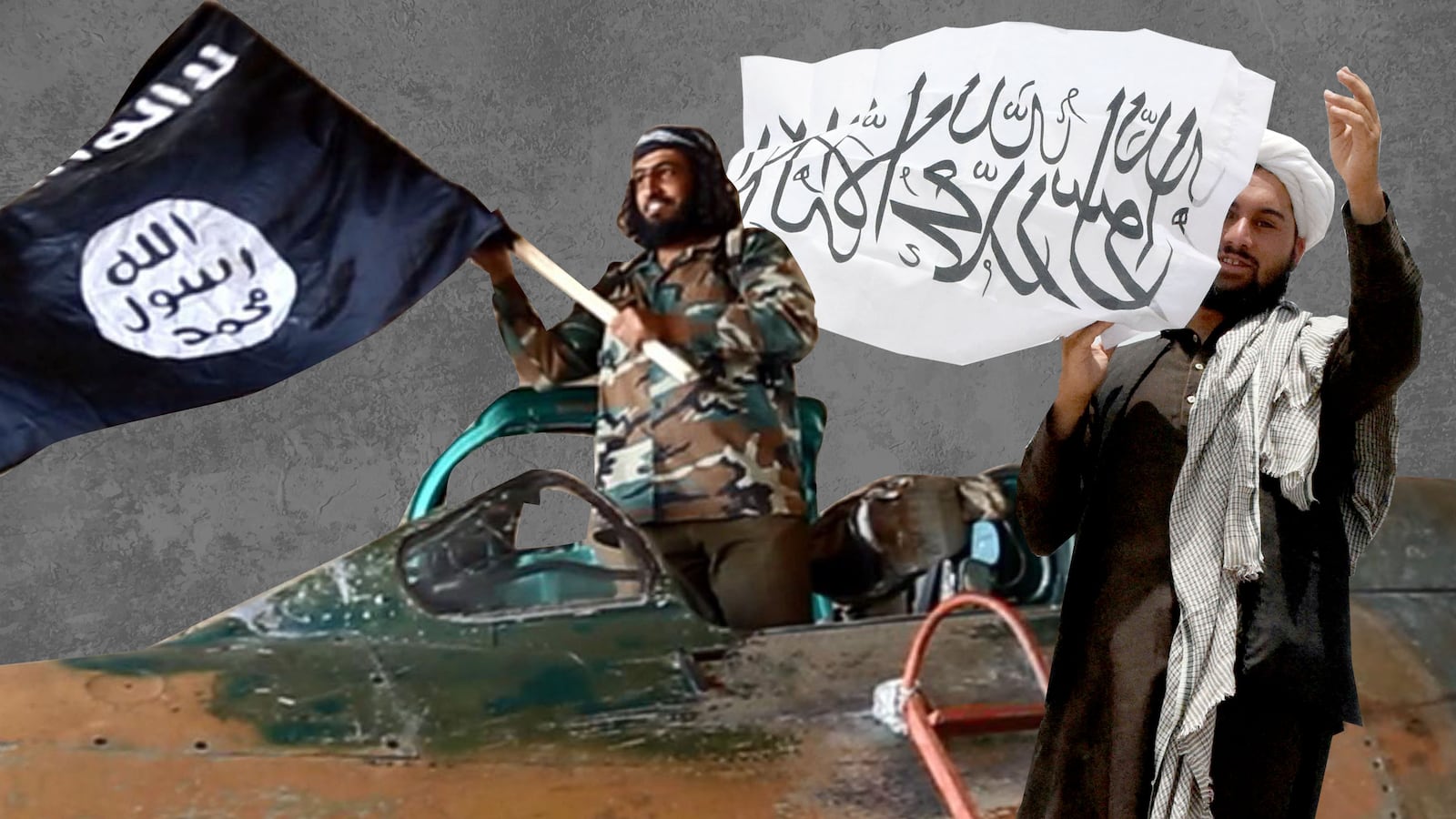There is a civil war being waged in the global jihadist movement. This war has been raging for half a decade, and is being conducted across multiple continents and dozens of countries. Today, it threatens to tear Afghanistan apart and disrupt evacuation efforts. For the Taliban, this civil war means a chance at establishing its authority over all of Afghanistan. For ISIS, it is the group’s last best chance at being able to win in Afghanistan.
As these two tigers tear each other apart, it will be the Afghan people who suffer. Thursday’s coordinated terrorist bombings right outside Hamid Karzai International Airport in Kabul—carried out by ISIS militants belonging to the Khorsan sub-group—are an an example of that.
Many in the U.S. defense establishment saw this attack—which killed nearly 100 Afghan refugees and 13 U.S. troops, and injured hundreds more—coming for several days. The New York Times even reported the possibility Wednesday. The reason for this simple fact is that the Taliban and al Qaeda are involved in a jihadist civil war with ISIS, and Americans and our allies are caught in the cross-fire.
When ISIS leader Abu Bakr al-Baghdadi, the False Caliph of Raqqa, announced the creation of the Islamic State, he was declaring war not only against the United States and its allies, but also against al Qaeda and the Taliban. This fomented a civil war in which al Qaeda and ISIS franchises would compete with one another all across the world. One of these battlegrounds is in Afghanistan and Pakistan, or Khorasan in jihadist parlance. ISIS-K and the Taliban have been at war since 2015, forcing third-party jihadists to choose a side.

ISIS and the Taliban have been at war for years. In this 2017 photo, a soldier with the Afghan National Army stands at an outpost in the Momand Valley that was previously used as a jail by ISIS-K.
Andrew Renneisen/GettyIn recent years, ISIS-K saw most of its territory lost, some to the now-defunct Afghan government and other parts to the Taliban. With ISIS-K perceived as the more dangerous actor, third parties have coordinated with the Taliban to oppose ISIS. Pakistan is one such actor, while another is Russia. Over the last couple years, ISIS-K has largely resorted to terrorist attacks, several of which have been highly lethal. In May, ISIS-K was likely responsible for over 90 killed in a terrorist attack on a high school in Kabul, and there are dozens of incidents that could be invoked as well. With the Taliban having near-complete control over Afghanistan, it was inevitable that ISIS-K would take action. Indeed, this might be their last chance to obtain victory.
ISIS does not believe that the Taliban are a legitimate jihadist actor. When it saw the Taliban’s rapid rise to prominence in the war against the Afghan government, ISIS declared that the takeover was the result of a corrupt conspiracy between the United States and the Taliban. All the proof it needed was that the Taliban was not preventing U.S. citizens and local partners from escaping through the Kabul airport. Any local Muslims who worked with the United States and were leaving the country are considered apostates to ISIS, and as such could have takfir (excommunication) placed upon them. In the war between ISIS and the Taliban, our local partners are, and remain, a priority target.
When ISIS attacked the airport in Kabul, it was engaging in a game of one-upmanship. This is meant to convey to jihadists and potentially radicalizable Afghans that in the quest for global jihad, ISIS is the more capable terrorist group. When the Taliban and al Qaeda were reluctant to attack the airport, they granted the initiative to ISIS. This type of activity is actually rather common among competing terrorist groups in times of negotiation, and Wendy Pearlman wrote a piece worth reading about it. The basic idea is that when terrorist groups are fighting against a common enemy, they will try to outcompete one another with regards to the level of the target attacked or the brutality inflicted (which is called outbidding). When one group tries to negotiate and appeal to a more moderate stance, the weaker, more radical party, will pick up their game to make high-profile attacks and usurp leadership of the terrorist movement (spoiling).

The injured from the airport attack are rushed to the hospital.
ReutersThis dynamic will define the immediate future of Afghanistan. If ISIS fails in its quest to outbid and spoil the Taliban takeover of Afghanistan, it could very well be on the path of total defeat.
The Taliban, for all its power, is in a vulnerable position right now. It has succeeded in taking over most of the country. While some resistance remains, the Taliban will transition from an insurgency to a ruling government. Most of the territory it now rules will be comparatively unfamiliar to it. This will provide ISIS with an opening to move into territories not yet consolidated by the Taliban and make it their own.
In order for them to succeed, they must either convince bystanders to join their cause from the local Afghan population, or encourage defectors from more radical contingents of the Taliban and al Qaeda. The best way for them to demonstrate their credentials is to engage in high-profile attacks. There will be more of them in the future, alongside kidnappings, ransoms, and worse.

Volunteers and medical staff unload bodies from a pickup truck outside a hospital after two powerful explosions shook the airport in Kabul.
Wakil Kohsar/GettyThe largest factor in determining whether ISIS has a chance is the degree to which the Taliban and al Qaeda are divided by multiple factions. If the Taliban are mostly unified as an actor, and have al Qaeda as a faithful and united auxiliary force, then ISIS doesn’t have a chance.
Where things become more complicated is if either actor is divided, or if the Taliban is moving to distance itself from al Qaeda. The more radical and rogue some parts of the Taliban or al Qaeda are, the more potential recruits ISIS will have. ISIS’s insurgency will need to be fueled by these defections.
One dangerous takeaway of this is that the more insecure the Taliban is, the more pressure it will feel to escalate its own actions.
With the Biden administration announcing that it will continue evacuation efforts and that it will launch retaliatory strikes against ISIS, we need to be prepared for further disruptions. We should expect more terrorist attacks. If not around Kabul’s airport, then elsewhere. If not a terrorist attack, then it may be a kidnapping. People who need to flee Afghanistan must be careful to avoid Taliban checkpoints. With Afghan biometric data compromised, the Taliban (and potentially ISIS) will have the ability to use this equipment to identify our local partners.
To make matters more screwed up, this attack may create support for the Taliban. In a battle between the Taliban and ISIS, some local Afghans may see the Taliban as the lesser of two evils. Local regional actors may develop a similar calculus. This is to be expected, but we should also remember that this is not a binary choice. There is a resistance movement.
The war between ISIS and the Taliban may well provide a window of opportunity for this resistance movement to consolidate itself.





